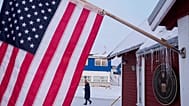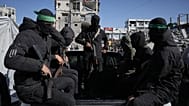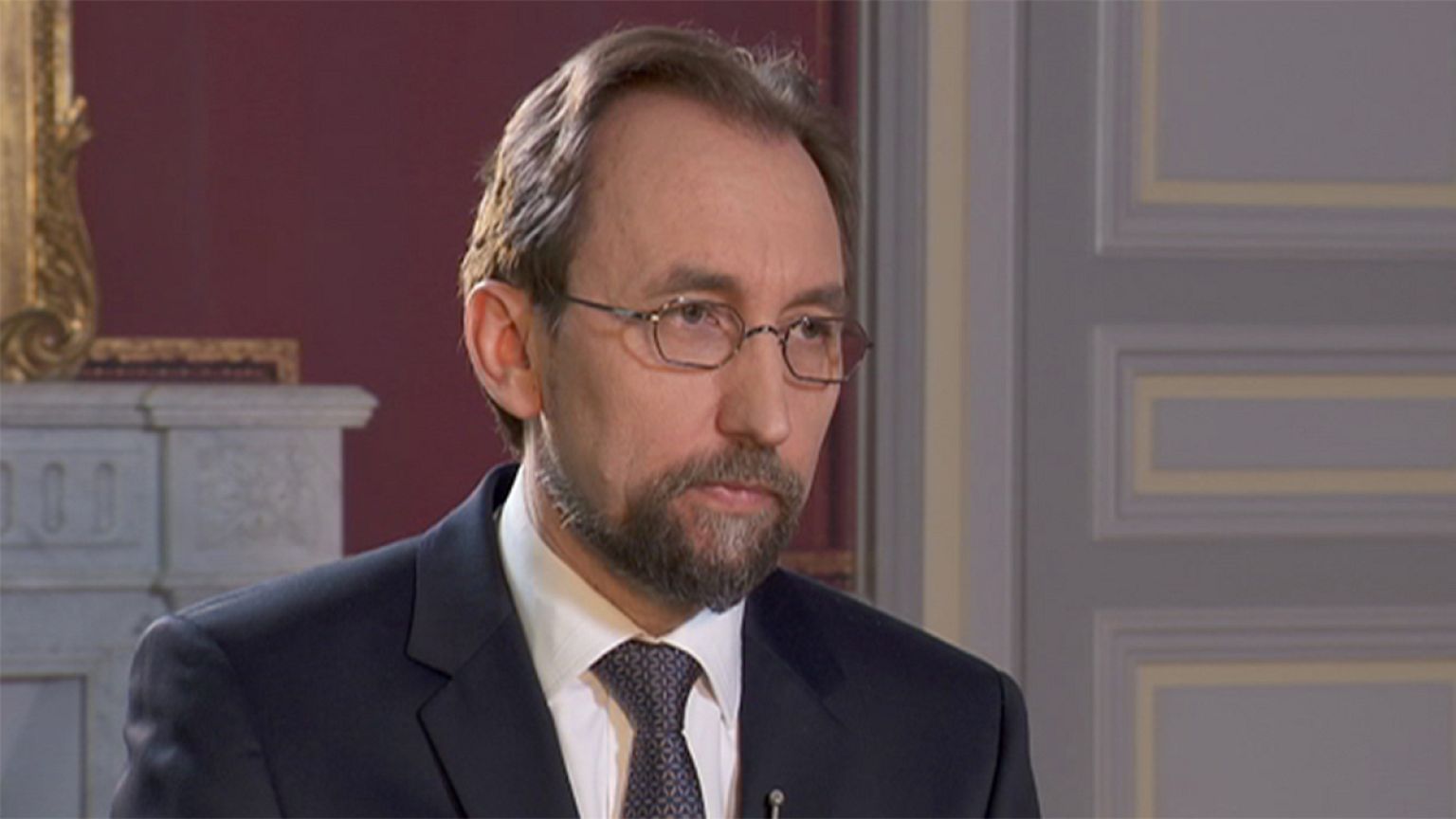Defending human rights “He is the UN High Commisssioner for Human rights. A tremendous responsibility in such troubled times. In the midst of the
Defending human rights
“He is the UN High Commisssioner for Human rights. A tremendous responsibility in such troubled times. In the midst of the refugee crisis, five years after the start of the war in Syria, with new forms of war pushing western democracies to the edge, how does he defend human rights? This is what we will try to find out. Zeid Ra’ad Al Hussein, welcome to The Global Conversation.”
Zeid Ra’ad Al Hussein, UN High Commissioner for Human Rights: “Thank you so much.”
Audrey Tilve, euronews: “Let’s begin with this controversial deal that Europe and Turkey are trying to implement. Greece has started deporting migrants and refugees back to Turkey. The plan is to do it massively. You’re being very critical. Why?”
Zeid Ra’ad Al Hussein: “There are four points that concern us. The first point concerns the processing centres becoming detention centres and we already see this on the island of Lesbos. We’re also concerned about the humanitarian conditions, about whether Turkey does qualify as a safe third country. And finally, there seems to be an inherent contradiction between a desire to return all and individual assessment.”
Hi colleaques; UN says Turkey migrant plan illegal: UN rights chief Zeid Ra’ad Al Hussein… https://t.co/WRpLyN83R1 Follow me
abdilleni</a></p>— Noor Iman Abdille (Abdilleni) March 10, 2016
The Syria situation
Audrey Tilve:
“Syria’s neighbours are bearing a huge burden. Nearly five million people have fled Syria and most of these people are living in Turkey, but also in Lebanon and in your country, Jordan. About two months ago, King Abdullah of Jordan said : the dam is going to burst. What did he mean?”
Zeid Ra’ad Al Hussein: “If you look at the debt ratio, the debt to GDP ratio, it is increasing because of this responsibility that has been given to the neighbouring countries, in particular Lebanon or Jordan, and I think the feeling is that this is grossly unfair.
“The conflict has lasted now for five years and the responsibility for ending these sorts of conflict falls principally on the UN Security Council where you have five states, five member states, who have a special responsibility.
That mechanism put into place after the Second World War to prevent these conflicts has not been successful in the case of Syria and has led to the exporting of ISIS from Syria to Iraq, has led to this outflow of refugees…
Biography: Zeid Ra’ad Al Husssein
- He has been United Nations High Commissioner for Human Rights since the September 1, 2014.
- He was previously Jordan’s Permanent Representative to the United Nations in New York.
- He has a long familiarity with international criminal justice, international law, UN peacekeeping and post-conflict peace-building.
- He played a central role in the establishment of the International Criminal Court and has been very commited in the fight against sexual exploitation and abuse in UN peacekeeping operations.
Audrey Tilve: “Are you saying that it’s because the UN Security Council hasn’t been able to agree on a stance that the situation is what it is today in Syria?”
Zeid Ra’ad Al Hussein: “Well, the Security Council has a special responsibility to ensure that conflicts of this nature, that can be centrifugal, that can be very dangerous and that can drag in many players which is what Syria has done, be brought to an end. And clearly the fact that it hasn’t over the last five years is a demonstration that the Security Council has failed.”
Audrey Tilve: “You were the first Muslim to be appointed High Commissioner for Human Rights. There are growing tensions towards the Muslim community in Europe because of these terror attacks in the name of God. And even though I know and you know that this bloodshed has nothing to do with religion, muslims are being looked at with growing suspicion in the West. Considering this, what would be your message to the Muslims of Europe?”
Zeid Ra’ad Al Hussein: “I think a more careful understanding of developments would show that these groups, these Takfiri groups (extremist groups, Takfiri means literally excommunication) have targeted Muslims, other Muslims in numbers that would dwarf the non-Muslims, with the exception of certain groups in Iraq for example.
“But the Takfiris, whoever they believe doesn’t share their ideology is considered an apostate and is not fit for life, and this is what the Islamic world has had to confront almost before Europe. And clearly, we have to do more in the Islamic context, clearly.
“But what we need also is for Europe to very carefully understand that painting with a broad brush produces very terrible results, and European history is filled with examples of this and I don’t need to point them out.”
AJENews</a> Zeid Ra'ad al-Hussein, High Commissioner for Human Rights.; Thousands may have starved to death in Syria: <a href="https://t.co/hO4BP7Dnl4">https://t.co/hO4BP7Dnl4</a></p>— ursula froese (ufroese) February 29, 2016
Audrey Tilve: “The fight against impunity is one of your big challenges and you were very committed to the creation of the International Criminal Court back in 2002.
“Fourteen years later – tell me if I’m wrong – I think only about three people have been convicted by this court, and all convictions and almost all ongoing investigations only concern one continent: Africa. Why?”
Zeid Ra’ad Al Hussein: “You have to understand how the court works. The court works on the basis of jurisdiction, which can only be obtained if a country joins or if the Security Council makes a referral.”
Audrey Tilve: “So is the court’s scope limited by the fact that many countries do not recognise it ?”
Zeid Ra’ad Al Hussein: “Yes, yes, or the Security Council is unwilling to refer a case, and for that reason then, you don’t have jurisdiction. When we first agreed on the statute, I think we felt that the world would change overnight, we felt that it was such a major step forward toward ending impunity that the world would change overnight.
“Looking back, one understands that this takes a long time before the political leaderships around the world understand there cannot be unrestrained exercise of power, that there is a limit to how you conduct military operations, that there is no willingness to agree to amnesties on the part of the Human Rights Office or other parts of the UN when trying to find a peace deal for example.”
The Assad question
Audrey Tilve: “Let me ask you a very concrete question with a concrete example. Syria not recognising the International Criminal Court, is there any chance that, for instance, Bashar al-Assad might be judged by this court one day ?”
Zeid Ra’ad Al Hussein: “There is a chance and I think it could well happen. We can never say that all these people who are thought to have been the authors of crimes will escape justice because we’ve seen in a number of cases people…”
Audrey Tilve: “How?”
Zeid Ra’ad Al Hussein: “We’re collecting evidence, more and more agencies are collecting evidence and in time we hope that the evidence will be brought to a court of law where the person standing accused would be put on trial.”
Audrey Tilve: “The image of UN peacekeeping missions has been severely tarnished by many cases of sexual abuse in the past few years. Recently, more than a hundred cases have been reported in the Central African Republic. The rule is to send back home the soldiers who commit such abuse and the whole unit. But there is still no obligation to judge these people. Is this enough?”
Zeid Ra’ad Al Hussein: “Thank you for raising this. I mean, it is absolutely repugnant that there are people in whom victims, communities, vulnerable communities place their trust, peacekeepers, who stand accused of these sorts of horrific allegations. It is incumbent on the sending country, the country of nationality, to ensure that there is no impunity. The most the UN can do is remove them basically from service by sending them back…”
Audrey Tilve: “So if these countries do not want to judge these people, there is nothing you can do about it…”
Zeid Ra’ad Al Hussein: “Well, we can keep pressing them and yes, the UN can say: we won’t take soldiers from your country anymore and pressure like that. But ultimately, it’s they who have to realise that the responsibilities return to them.”
Audrey Tilve: “Zeid Ra’ad Al Hussein, thank you very much.”
Zeid Ra’ad Al Hussein: “Thank you so much.”














